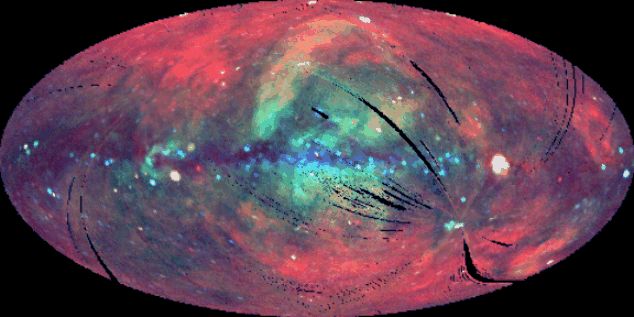ROSAT Explores The X-Ray Sky

Explanation:
Launched in 1990, the orbiting
ROSAT observatory explored the Universe by
viewing the entire
sky in x-rays -- photons with about
1,000 times more energy than visible light.
This
ROSAT survey produced the sharpest, most sensitive
image of the x-ray sky to date.
The all-sky image is shown with the plane of
our Milky Way Galaxy running
horizontally through the center.
Both x-ray brightness and relative energy
are represented with red, green, and blue colors indicating three
x-ray energy ranges (from lowest to highest).
Bright x-ray spots near the galactic plane are within our own Milky Way.
The brightest region (right of center) is toward the
Vela Pulsar and the Puppis
supernova remnant.
Bright sources beyond our Galaxy are also apparent, notably the
Virgo cluster
of galaxies (near top right) and
the
Large Magellanic Cloud (LMC).
The LMC is easy to find here as
several of the black stripes (blank areas caused by missing data) seem
to converge on its position (lower right).
Over large areas of the sky a general diffuse
background of x-rays dominates.
Hot gas in our own Galaxy provides
much of this background and gives rise to the grand
looping structures
visible in the direction of the galactic center (image center).
Unresolved extragalactic sources also add to this background, particularly
above and below the plane.
Despite the x-ray sky's exotic appearance,
a very familiar feature is visible -
the gas and dust clouds which line the plane of our galaxy
absorb x-rays as well
as optical light and produce the dark bands running
through the galactic center.
Authors & editors:
Robert Nemiroff
(MTU) &
Jerry Bonnell
(USRA)
NASA Web Site Statements, Warnings,
and Disclaimers
NASA Official: Jay Norris.
Specific
rights apply.
A service of:
LHEA at
NASA /
GSFC
& Michigan Tech. U.

